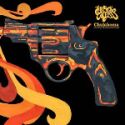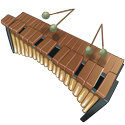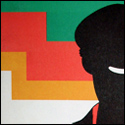|
If it is a high fret try starting at the end of the fretboard, play one string and move lower a fret at a time until the buzzing starts, or go the opposite way and play until the buzzing stops. You'll probably have two frets that produce the same pitch, the higher one is the culprit. You can then check with the ruler, though something shorter would probably be easier, as you'll want to bridge three frets (with the suspected high one in the middle). The ruler should rest on the first and third, if it rocks back and forth on the middle it is too high. If you don't find any high frets, your bridge could just be too low. I know you've got it set to Gibson specs, however Gibson has some trouble setting their neck angles correctly and/or changes them sometimes. There could be too much angle, so your bridge will need to be higher. http://www.thegearpage.net/board/showthread.php?t=456365
|
|
|
|

|
| # ? May 11, 2024 10:52 |
|
Yeah, I heard about Gibson and the "whatever works" neck angle on some of their guitars. I chose this one as the bridge was set low from the factory and it didn't buzz with the miserable pieces of wire that were put on it at the factory. I didn't think I'd have a problem on the other end of things. Sigh, oh well. On the bright side I get to be a tool whore and buy one of those overpriced fret gauges and maybe some files and crap from StewMac 
|
|
|
|
Any tips for self-teaching jazz focused trumpet? I played in school, quit for a while and now I'm coming back. I've been working through The Jazz Method for Trumpet but I don't really feel like I'm gaining a better grasp of the theory. The book often references things like pentatonic scales (which it then lays out, briefly) but it doesn't really elaborate on how these are implemented into written or improvised jazz. I feel like I have a book of jazz sheet music and fingering charts with disjointed music theory terms, lacking real cohesive explanation.
|
|
|
|
Invisible Ted posted:Any tips for self-teaching jazz focused trumpet? I played in school, quit for a while and now I'm coming back. I've been working through The Jazz Method for Trumpet but I don't really feel like I'm gaining a better grasp of the theory. The book often references things like pentatonic scales (which it then lays out, briefly) but it doesn't really elaborate on how these are implemented into written or improvised jazz. I feel like I have a book of jazz sheet music and fingering charts with disjointed music theory terms, lacking real cohesive explanation. A couple of suggestions: - "The Jazz Theory Book" by Mark Levine is excellent, though not an easy book. I've still only digested a small fraction of it, but it's been very rewarding. It starts with fundamentals like intervals, modes, and practicing scales (with lots of examples relating to jazz tunes), and works up to advanced topics like Coltrane changes, composition, and reharmonization. It's been really eye-opening and I expect it to keep me busy for years. - Gary Burton is teaching a free online course on jazz improv on Coursera. I took the same course last spring and it was challenging but terrific. Only thing is, the current track of the course is almost finished, I'm not 100% sure it'll still let you sign up, and you wouldn't be able to follow along with the weekly playing assignments (which are really helpful). But it still might be worth seeing if you can sign up just to download the lecture videos and watch them at your own pace. Burton also has a good improv master class on youtube that's worth watching (the lecture part is about an hour), and if you search for "jazz improv lecture" on youtube you'll probably find some other worthwhile things. I'm not an expert, but would be happy to put my two cents in if you have questions about any specific bits of theory or whatnot.
|
|
|
|
h_double posted:A couple of suggestions: Thanks! I got into that Burton course, his lecture videos are incredibly useful. I'll have to pick up that book as well, it looks like a great resource. One question that's been coming up in my mind that sounds really basic, but what makes a scale major or minor (or dominant 7, if that isn't to complicated)? I also don't entirely understand the nomenclature when a scale is referred to as having something like a high four. It makes sense to me in the context of the Lydian scale, where the fourth note is sharp. However, with the altered scale, the second note is referred to as being a flat 9, and the numbering continues throughout, not making sense to me sequentially. I feel like I'm missing a few concepts from the foundations of scales in music theory, but I feel I now know what scales I can focus on and how to practice them, as well as how to apply them.
|
|
|
|
Invisible Ted posted:Thanks! I got into that Burton course, his lecture videos are incredibly useful. I'll have to pick up that book as well, it looks like a great resource.  Okay, so you've got a piano keyboard. Let's say you play a simple scale starting on C, on just the white keys (C D E F G A B C). You can describe that scale as a pattern of whole tones (like from C to D, since you're skipping the black C#/Db key) and half tones (like from E to F, since there's no black key between those notes). In this case, the pattern is "W W H W W W H". We can go on to extract chords from our scale. The most basic chord is a triad, which is the first (root note) degree of the scale, the third degree, and the fifth degree. In this case, "C E G". If we play this chord, it'll sound pretty bright and bold. If we count the distances between the notes, we see that it's four semitones distance from C to E (C#,D,D#,E), and then another three semitones to G (for a total of seven). That interval of four semitones from the root is a major third interval, and that lets us know we've got a C Major chord on our hands. Now let's say you spell out a scale starting from A instead, again sticking to the white keys (A B C D E F G A). This gives a different pattern of whole/half tones (W H W W H W W). If we make a triad from that scale (A C E) and play that chord, it sounds more dreamy and mellow. If you look at the distance between the notes in the chord, it's three semitones (a minor third) from A to C, and another four to the perfect fifth (E). The minor third tells us it's a minor chord. With this knowledge, we can start counting on any note and spell out a major or minor scale by applying those patterns of whole/half notes (e.g. start from Bb, count up by W W H W W W H, you get "Bb C D Eb F G A B", for a Bb Maor scale). We can also spell out a major or minor triad by counting up 3 + 4 for a minor triad (Bb Db F) or 4 + 3 for a major triad (Bb D F). But since we want to sound jazzy, we don't want to settle for simple triads, we want to add in a bunch of 7th chords to add more harmonic color. A 7th chord is the 1 3 5 7 notes of the scale, and if you look at the distance between the (perfect) fifth and the seventh interval, you can tell if it's a minor (3 semitones) or major (4 semitones). So now we know: Major 7th chord: root, major third, perfect fifth, major seventh Minor 7th chord: root, minor third, perfect fifth, minor seventh Now lets add last thing, and count out a scale on the white keys starting on G (G A B C D E F G), and take the 1/3/5/7 notes from that, G B D F. It's a major third from G to B, but only a minor third from D to F. This lets us know we have a Dominant 7th chord. Dom7 chord: root, major third, perfect fifth, minor seventh Dom7 chords are really popular in jazz because they have a kind of lingering tension, which you can hear in a chord progression like "Dm Gdom7 Cmaj", that kind of hangs there until it's resolved by the C major chord at the end. Anyway hopefully I haven't horribly confused you with all this. The gist is that scales and chords are built from patterns of intervals, and that particular intervals have particular mood and "color" associated with them. If you have a pool of notes (say the C major scale), and start counting on a different note of the scale, you get a different pattern of intervals -- this is how the different modes work (and in fact the Major scale is exactly the same as the Ionian mode, Dom7 chords are built from the Mixolydian scale, etc.) This stuff all really comes together when you spend a while getting it in your ears, practicing the different scales and improvising them over different changes. quote:I also don't entirely understand the nomenclature when a scale is referred to as having something like a high four. It makes sense to me in the context of the Lydian scale, where the fourth note is sharp. However, with the altered scale, the second note is referred to as being a flat 9, and the numbering continues throughout, not making sense to me sequentially. The way Burton explains the altered and symmetrical diminished scales is a little weird and I honestly don't quite get it myself. The 9th degree of the scale is the same note name as the 2nd (since after the 7th, you start over with a new octave. Personally I find it easier to understand those scales as: ALTERED 1 (root) b9 (min 2) #9 (min 3) 3 (maj 3) #11 (aug 4) b13 (min 6) b7 SYMMETRICAL DIMINISHED 1 (root) b9 (min 2) #9 (min 3) 3 (maj 3) #11 (aug 4) 5 (per 5) 6 (maj 6) b7 But I really haven't used those two scales much outside of that course, they are still largely new territory for me. h_double fucked around with this message at 08:43 on Nov 21, 2013 |
|
|
|
Awesome! Of all that, I can honestly say I have only two questions:h_double posted:That interval of four semitones from the root is a major third interval, and that lets us know we've got a C Major chord on our hands. What lets you know that that's a major third interval? Is it just kinda something that "is", you don't really question it, or am I missing something? quote:SYMMETRICAL DIMINISHED What tells you which is a major and a minor? Similar to last question, but it seemed to me initially that major/minor could mean something like sharp/flat, but again this contradicts that notion. Thanks a bunch, you've been wildly helpful! Invisible Ted fucked around with this message at 07:40 on Nov 21, 2013 |
|
|
|
Invisible Ted posted:What lets you know that that's a major third interval? Is it just kinda something that "is", you don't really question it, or am I missing something? Yeah, you've got the right idea. The intervals in an octave are as such: 0 semitones (C to C) = unison 1 semitone (C to C#/Db) = minor second 2 semitones (C to D) = major second 3 semitones (C to D#/Eb) = minor third 4 semitones (C to E) = major third 5 semitones (C to F) = perfect fourth 6 semitones (C to F#/Gb) = augmented fourth (aka raised fourth, flattened fifth, tritone) 7 semitones (C to G) = perfect fifth 8 semitones (C to G#/Ab) = minor sixth 9 semitones (C to A) = major sixth 10 semitones (C to A#/Bb) = minor seventh 11 semitones (C to B) = major seventh 12 semitones (C to C') = octave From there, you can count up into the next octave, the most common chord extensions are the 9th, 11th, and sometimes 13th (octave plus a second, fourth, or sixth), and it's just more common and usefully descriptive to talk about a b9 rather than a sharp octave. Different people sometimes use slightly different terminology, so that a "raised fourth", "augmented fourth", and "sharp four" are exactly the same note. All of this makes more sense when you spend a bunch of time applying it musically, practicing and improvising with scales, to get a sense for how the different intervals "feel". h_double fucked around with this message at 09:17 on Nov 21, 2013 |
|
|
|
Alright, I think I'm getting what you're laying down. Thanks again!
|
|
|
|
Glad to help! Also you should check out the improv thread here, it's a bit neglected but there's some great info in there.
|
|
|
|
Is there a thread here or other to help collaborate with other musicians? I have a decent set up to record bass/guitar/vocals.
|
|
|
|
puddincup posted:Is there a thread here or other to help collaborate with other musicians? I have a decent set up to record bass/guitar/vocals. http://forums.somethingawful.com/showthread.php?threadid=3423187 Stickied and everything. EDIT: that thread is mostly (not exclusively) for working with folks in person; if you're looking to collab with somebody online, I don't think we have a thread specifically for that. h_double fucked around with this message at 22:33 on Nov 21, 2013 |
|
|
|
Yes I'm looking to collaborate mostly online. I would start a new thread but I don't believe I have enough experience in the forums.
|
|
|
|
ML is a pretty chill/friendly forum, and honestly could use more threads, so please do make a thread if you're so inclined! (Just be sure to pick a thread tag if you do, otherwise your post will get a "poo poo POST" tag by default).
|
|
|
|
Bugdrvr posted:I recently bought a 70's tribute Gibson SG and I think it's got a problem. Sigh, so much for Gibson quality. I tried messing around with my SG (problem posted above) and can't get it to stop making horrible fret buzz without having monster truck high action and way too much neck relief. My fret rocker says maybe one fret is the tiniest bit high but I'm not taking a file to it with only ignorance as my guide. It's going to my guitar guy this week where hopefully he can make a decent guitar out of it. Next problem in the "plague me into hating musical things" odyssey! My Marshall DSL 201 combo amp started playing only at about 1/10th volume even with it cranked to 10 on either the clean or OD channel. This thing used to be too loud at anything over about 3 on the master volume so it's definitely not happy about something. I've read a ton of poo poo on Marshall forums about the tube socket solder joints weakening and re-flowing them fixes it. I've got a lot of electronic fixin' experience but I'd like to know what I'm looking for when I take it apart. Any of you guys ever have the same problem? I need to pick up a spare set of tubes anyway so I'll try substituting the new ones when they get here. My gear: It's expensive yet it still sucks. I think I need to go to Costco and pick up a Starcaster starter kit. Should work better than the poop I've got now. EDIT: Hmm, more reading says my amp in my year is common for overheated and cooked solder joints on the bridge rectifier. Seems easy enough to repair and I finally get to use one of those million heat sinks I've saved over the years. Bugdrvr fucked around with this message at 01:13 on Nov 25, 2013 |
|
|
|
I'm looking for a good freeware MIDI sequencer/editor with, at the very least, the ability to view/edit the MIDI file in the form of a piano roll or.. er.. sheet music-like? I'm not really that well-informed when it comes to music. Many years ago I had a trial version of Music MasterWorks, which was pretty much just what I'm looking for now -- except after thirty days had elapsed the program became increasingly urgent and annoying about the expired trial period. Anyways, advice on some good ones would be greatly appreciated. I'm quite reluctant to start installing programs willy-nilly without any recommendations.
|
|
|
|
|
Studio One Free is a pretty good DAW if your needs are basic (and in particular if you don't need VST plugins). Of course the paid versions are more featureful. If you want a notation editor (ie. sheet music) instead of a DAW/piano roll kind of thing, Notion is pretty decent, and while it's not free, it's only 50 bucks for the next week or so. If you have an iPad the iPad version is also good and cheaper (but they microtransaction you for soundpacks).
|
|
|
|
I made this post in another thread but it never got answered. Is the Launchkey 25 a good choice for a beginner that just wants to gently caress around in FL Studio and Abelton? I might spring for the 49 key but desk space is at a premium right now so I'm hoping I can get away with the 25.
|
|
|
|
How common is it to build your own guitar? was looking on ebay and you can get a built of un-built body. Seems like you could put some cool parts into it depending on how much i want to spend. is it as easy as it looks and would i ever be able to sell it if i decided to get something really fancy?
|
|
|
|
I have a new band that's landed a weekly gig at a local club for decent money. Up until this point the guitarist has simply deposited the check from the club every week into his account and written checks for the individual band members. He's concerned that he's going to run into tax issues (in the United States) with all this money flowing into and out of his personal account on a weekly basis. Is this something to be concerned about, and what should our next step be?
|
|
|
|
St. John Coltrane posted:I have a new band that's landed a weekly gig at a local club for decent money. Up until this point the guitarist has simply deposited the check from the club every week into his account and written checks for the individual band members. He's concerned that he's going to run into tax issues (in the United States) with all this money flowing into and out of his personal account on a weekly basis. Is this something to be concerned about, and what should our next step be? Also, you don't need to worry about the IRS watching bank accounts. When they audit the club, those checks written to the guitarist will be enough for the IRS to call.
|
|
|
|
Since you mentioned it, do you have any recommendations for general resources about Canadian income tax? I'm an American living in BC and for band-related and other reasons I think I need to get my head around how that works up here.
|
|
|
|
The CRA website should have some basics; can probably even get some answers over the phone from them. Canada is different than the US in that all income related taxes are administered by the same body--except in Quebec--so you don't need to understand local tax codes. But you've gone past "ask an accountant" and into "talk to a lawyer" territory. There are a lot of considerations in your situation and I wouldn't be confident in getting it all right on your own.v
|
|
|
|
There's a couple threads in BFC that might be helpful: Canadian Income Tax thread: http://forums.somethingawful.com/showthread.php?threadid=3253327 US Income Tax Thread: http://forums.somethingawful.com/showthread.php?threadid=2649574 (This has been moved to the comedy goldmine, so you can't reply. That makes it of dubious use, and there doesn't seem to be a current thread for it,) Invisible Ted fucked around with this message at 08:49 on Dec 5, 2013 |
|
|
|
Wow, of course there's a giant thread for it. I didn't even think to look. The CRA site looks pretty good too. Man, ML always delivers. 
|
|
|
|
Pretty recently I think, I was reading something in ML that was talking about a goon-made piece of software that would let you pick out snippets of a song, slow them down, and loop them to practice along with. Now I can't seem to find the post anywhere. I'm probably dumb and it's probably in this same thread (although I tried looking through the last six pages or so, as well as searching for it), but does anybody happen to know what this is? VVV That's it! Thank you! Scuzzywuffit fucked around with this message at 01:28 on Dec 6, 2013 |
|
|
|
http://bpminus.com/
|
|
|
|
Now if only it were on Mac too, sigh
|
|
|
|
http://www.seventhstring.com/xscribe/overview.html
|
|
|
|
Any of you gently caress around with cSound or SuperCollider? I had fun playing with Tidal, but its a pattern engine with limited predefined samples for composition. While its interesting to write functions to pass samples through to get new distinct sounds to string together, its not a synthesis library. I program computers/write lovely code and have a math background, but literally no music education. The books I'm finding are geared towards musicians who want to learn to program via algorithmic composition, but the reverse of that is hard to find. I want to make sounds in the spergiest way possible, hjelp me get started please.
|
|
|
|
salisbury shake posted:Any of you gently caress around with cSound or SuperCollider? I had fun playing with Tidal, but its a pattern engine with limited predefined samples for composition. While its interesting to write functions to pass samples through to get new distinct sounds to string together, its not a synthesis library. I've never messed with SuperCollider, but for what it's worth I took some CSound courses in college and ultimately I found it hard to enjoy, both as a programming experience and a way to make music. I'm a musician who enjoys programming, but CSound involved too many idiosyncrasies and unintuitive quirks of the language for me to really enjoy it. The language felt old and outdated to me. With that warning aside... In my opinion, CSound is best suited to making ambient music/soundscapes or generating one-off sound designs. You'll learn a lot about synthesis and sound-manipulation on the microscopic level but nothing about music theory/composition. For example, it doesn't do any out-of-the-box handholding in terms of musical notes (you're working with frequencies, not musical notes). So if you're not a musician, you might actually like that because CSound requires absolutely no knowledge of music. It's more about using code to tell the computer EXACTLY what to do with oscillators or samples over time. There are different front-ends/plugins/etc that supposedly make CSound more user-friendly but I never really used them, because the point of CSound is to code sounds, and if you want to make noise with a nice UI then open up Ableton and you'll have a much better time (and get things done much quicker). If you do end up learning CSound, you can PM me if you need help (I don't remember much of it but I can probably help with the basics).
|
|
|
|
heap posted:
Cool, thanks for the response and offer. And those are the exact reasons I gravitated towards cSound and SC, although I'm beginning to agree with your points about cSound. There are definitely archaic design decisions that are hard to parse as a newcomer without regurgitating boilerplate on blind faith. Gonna play around with it for a bit , if it doesn't click then I'll move on to SC. Last time I played with Ableton, Logic and friends, I only gained a superficial understanding of the programs. They seemed like a sequencer + production tools packaged with a software synthesizer. The latter is supposedly top notch, but the clunky interface mimicking irl hardware and the irl hardware idioms used to manipulate sound aren't intuitive to me. I have no actual hardware to interface and interact with the program which limits my experimenting to dragging my finger across a trackpad to move the little knobs. Then I give up in frustration and conclude that it would be more rewarding if everything was scriptable. Linking up effects, filters, and what have you translates in my mind to applying functions and transformations to a signal or pattern; hence the month long nerdgasm I've enjoyed from playing with Tidal. What's the workflow like with Ableton for someone who knows what they're doing from using the synthesizer efficiently to sequencing MIDI events? Do you do it all graphically by hand, or is there a way to automate things with macros or scripts? Approaching it naively has probably given me the wrong idea about how it can be used. Focusing on minutiae without a concept of how it fits with the bigger picture will become dissatisfying fast, as I'm going to want to use these sounds and instruments for something, so DAW usage is inevitable. Which segues to my next question: Can you recommend material on music theory that would be relatable for someone with my background? Or just in general, idc. Videos, books, series of articles or interactive webshit are all okay in my book. Even better if they are somehow tied together with making computer music or using a computer to make music.
|
|
|
|
salisbury shake posted:What's the workflow like with Ableton for someone who knows what they're doing from using the synthesizer efficiently to sequencing MIDI events? Do you do it all graphically by hand, or is there a way to automate things with macros or scripts? Approaching it naively has probably given me the wrong idea about how it can be used. Well, I just mentioned Ableton as an example but I personally don't use Ableton, I use Reason for synths/samples and Reaper as my main DAW. You wouldn't like Reason if you don't like UIs that mimic hardware, since Reason does that in the extreme (for example, you control signal flow by moving virtual cables around to plug one unit up to another). So I can't answer your Ableton workflow question. But I do think it's important to note that you might be talking about two different workflows: one is designing sounds, and the other is arranging when sounds happen and at what pitches, etc. I am curious to see if SuperCollider fits what you're looking for. It might be a good idea to ask in the synthesizer thread, since I'm sure you can find folks who are into algorithmic sound creation. Also, if you haven't already, you might want to check out trackers since making music with them is based on inputting numbers/data into a grid. I've never used one though. Lastly, I don't know of any good music theory or computer music resources for you, all I have is a bunch of textbooks and stuff and none of them were Fantastic Reads Worth Recommending. Sorry! I'm sure someone around here knows of some good resources, though.
|
|
|
|
For just music theory, Tonal Harmony by Kostka and Payne is an amazing book that will take you from "what's a staff?" to composing atonal music. Make sure to do all of the quizzes, self-tests, and the homework from the (separate) workbook though, otherwise you'll barely understand what's going on by chapter 4.
|
|
|
|
I dunno if anyone on this forum plays violin, but I thought I'd ask anyway. I played violin for a year as a fifth-grader and liked the instrument but hated the teacher, and ended up dropping out. Now that I'm twenty-four I'd like to get back into music and give the violin a shot again. Are there any good starter models and instructional books or CDs for the violin?
|
|
|
|
polar posted:How common is it to build your own guitar? was looking on ebay and you can get a built of un-built body. Seems like you could put some cool parts into it depending on how much i want to spend. is it as easy as it looks and would i ever be able to sell it if i decided to get something really fancy? It's reasonably easy to assemble a guitar from parts, though if you are assembling totally from parts (separate neck + body) it can be a little finnicky making sure the neck + body are a good fit, the intonation is set up properly, etc. Ergo if you are results-oriented, it's usually easier to mod an existing instrument. (The SX instruments from Rondo Music are a great value if you're thinking in that direction -- the electronics are generally kind of crappy, but they are very playable and make awesome project instruments for the price. On the other hand, if you really wanted a spalted maple flying V with a rosewood neck with pot leaf fret dots and gold hardware, Warmoth or StewMac can probably hook you up with the bits to make that happen (at a price). Basically, I suspect that most people who build their own guitars do so for the learning experience or to have an interesting project, rather than because it's economical. Custom guitars don't hold their value very well either, unless you have an established rep as a luthier.
|
|
|
|
Pinball posted:I dunno if anyone on this forum plays violin, but I thought I'd ask anyway. I played violin for a year as a fifth-grader and liked the instrument but hated the teacher, and ended up dropping out. Now that I'm twenty-four I'd like to get back into music and give the violin a shot again. Are there any good starter models and instructional books or CDs for the violin? You should probably look into getting lessons honestly.
|
|
|
|
Question for the percussionists: what's the prominent rattle-like instrument used every few bars in Eldorado by Neil Young?
|
|
|
|
One Swell Foop posted:Question for the percussionists: what's the prominent rattle-like instrument used every few bars in Eldorado by Neil Young? Castanets, sounds like. https://www.youtube.com/watch?v=fPgjE_H2k9s
|
|
|
|

|
| # ? May 11, 2024 10:52 |
|
|
|
|




























